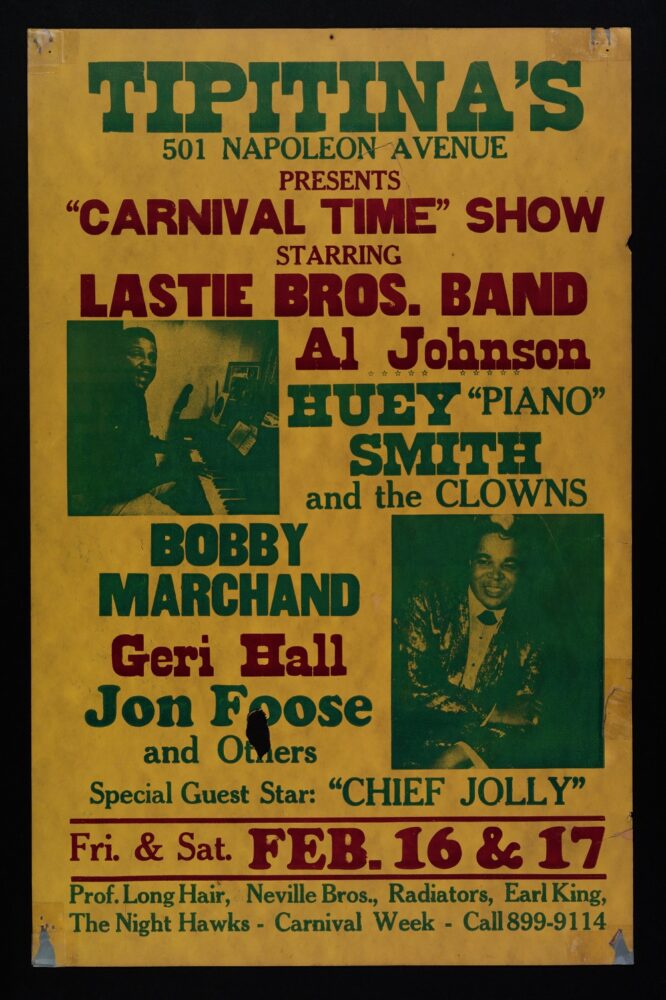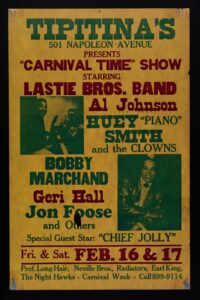Spring 2023
The Irrepressible Bobby Marchan
From drag to rap promotion and everywhere in between
Published: February 28, 2023
Last Updated: June 1, 2023

The Historic New Orleans Collection
A poster with photography by Michael P. Smith announcing a 1979 show featuring Marchan.
Singing brought Marchan his greatest national fame in the 1950s and ’60s. In 1958, as a member of Huey “Piano” Smith and the Clowns, he reached number nine on the Billboard Hot 100 chart with the call-and-response romp “Don’t You Just Know It.” In 1960 the solo Marchan rose to number one on Billboard’s rhythm-and-blues chart with his funny and passionate tale of love and murder, “There’s Something on Your Mind (Part 2).”
A native of Youngstown, Ohio, Marchan arrived in New Orleans with a female impersonator troupe in 1953. He soon began singing and emceeing at two major Black nightclubs, Club Tiajuana and the Dew Drop Inn. “Well, no sense in lying about it,” Marchan told interviewer Ben Sandmel on the Allison Miner Music Heritage Stage during the 1998 New Orleans Jazz and Heritage Festival. “I played the Dew Drop for $12 a night. Friday, Saturday, and Sunday. I got $48 and a free room. … But I enjoyed it. I wouldn’t trade it back for nothing.”
Marchan’s recording career began in 1953 with a single for Aladdin Records in Los Angeles. He released a follow-up on the Tennessee-based Dot label before signing with Johnny Vincent’s Ace Records in Jackson, Mississippi. In 1957, Marchan’s second single for Ace, “Chickee Wah-Wah,” anticipated the raucous recordings he’d make with Smith and the Clowns. In “Chickee Wah-Wah,” Marchan, a gay man who never hid his sexual orientation, plays the role of naïve young man who attracts an aggressive female.
Later in 1957, while Smith was playing piano for the touring New Orleans duo Shirley and Lee, with Marchan appearing solo as a supporting act, Marchan and Smith agreed to form a vocal group to capitalize on Smith’s chart-climbing new single, “Rocking Pneumonia and the Boogie Woogie Flu.” Although John “Scarface” Williams is the principal vocalist on the original “Rocking Pneumonia” recording, Smith knew that the dynamic, high-pitched Marchan would be a winning front man for his comic lyrics and proto-funk music. Marchan subsequently sang for several Huey Smith and the Clowns recordings, including “Don’t You Just Know It,” “High Blood Pressure,” “Havin a Good Time,” “Would You Believe It (I Have a Cold),” and “Well I’ll Be John Brown.” Ace Records credited another of Smith’s productions, the stomping Cold War satire “Rockin Behind the Iron Curtain,” as a Bobby Marchan and the Clowns single.
On the road with the Clowns, Marchan managed the group, handled the business, and rehearsed the big bands the Clowns performed with on the Black theater circuit. He later described these early years of stardom as “a stomp-down-party good time.”
Marchan found inspiration for his first solo hit in 1959, during a nightclub engagement with his female impersonator revue in Omaha, Nebraska. As Marchan explained it to Sandmel at Jazz Fest: “I said, ‘I’ve got to have a number to really get over. We can’t just keep doing the same thing over and over again.’” Marchan thought “There’s Something on Your Mind,” an R&B hit that year by Big Jay McNeely and Little Sonny Warner, could be the special number he needed. Although his first performance of the song disappointed him, an incident in the audience gave him an idea. “Some lady slapped a man,” he explained. “And so I started talking. ‘You know, it’s so hard to be in love.’ And the lady said, ‘It sure is.’ And I just kept on writing it each night, and then I got it—part one and part two.”
Marchan’s part two of “There’s Something on Your Mind” is a monologue about a jealousy-sparked double homicide. Audience reaction to his expanded version of the song convinced him that he should record it. Johnny Vincent at Ace rejected the idea, saying the McNeely–Little Sonny hit had exhausted the song’s commercial potential. “So I told Johnny,” Marchan said to Sandmel, “‘since you ain’t record it, I’m going somewhere and get it recorded. You’ll be sorry.’”
Recording “There’s Something on Your Mind” on his own, Marchan sent a copy to Bobby Robinson, one of the earliest Black producers and record company owners in the United States. Impressed by Marchan’s interpretation, Robinson nonetheless asked him to record it again, this time at Universal Recording Studios in Chicago. Robinson released that recording in its entirety, placing the singing on the A side of a 45 rpm single, opposite the monologue on side B. “Naturally,” Robinson says in notes for the 1992 boxset The Fire/Fury Records Story, “the disc jockeys started playing part one first, but soon people began requesting part two, which really gave the record a second lease on life. It ended up a smash!”
“I did the record by myself and then I got booked to do a solo tour for a thousand dollars a night,” Marchan told Sandmel. “That was the funniest thing that happened to me while I was with the Clowns.” More solo singles on the Fire label followed, but Marchan wouldn’t return to the R&B Top 40 until his 1964 Dial release, “I’ve Got a Thing Going On.” Cameo issued his final Top 40 R&B hit, “Shake Your Tambourine,” in 1966. In the ’60s Marchan also recorded for the Stax sister label, Volt, and toured with soul star Otis Redding. Recording into the late 1980s, he released singles via Sansu, Gamble, Ace, Mercury, and his own Manicure Records.
In the ’80s and ’90s, Marchan emceed for popular talent shows and performed regularly at the New Orleans Jazz and Heritage Festival. On April 30, 1998, his sixty-eighth birthday, he both performed at Jazz Fest and gave an interview at the Allison Miner Music Heritage Stage, despite having undergone dialysis that morning.
“They asked me to go to Japan, but I couldn’t because of the dialysis situation,” he said in the interview. “I would like to go to Japan and thrill the people over there, because I know I could. I’m having so much fun today on my birthday. So, if you got a question, you better ask them while I’m here.”
The following year, Marchan made his forty-seventh Jazz Fest appearance—a feat given that the festival was only in its thirtieth year. It would be the final Jazz Fest appearance for the performer who never lost his zeal for the stage, even as he neared death at the Stonebridge Convalescent Center in Gretna. Speaking there in late 1999 to Gerri Hall, his fellow 1950s-era Clown, Marchan asked where his shoes were and if his valet had prepared his bags for a two o’clock flight to Florida. “Bobby would not give up,” Hall later said of the most tenacious entertainer she’d ever meet.
John Wirt has written thousands of music and film stories and reviews. He’s also the author of the New Orleans music biography Huey “Piano” Smith and the Rocking Pneumonia Blues, a Japanese translation of which was published in 2022.
